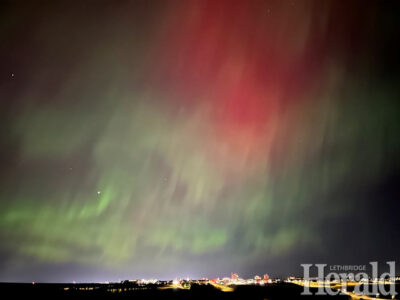Geomagnetic storm responsible for brilliant display of aurora borealis
By Alejandra Pulido-Guzman - Lethbridge Herald on October 16, 2024.
 Herald photo by Alejandra Pulido-Guzman
Northern lights illuminate the city's skyline in a brilliant display last week, a result of high energy particles ejected from the sun colliding with the Earth's atmosphere.
Herald photo by Alejandra Pulido-Guzman
Northern lights illuminate the city's skyline in a brilliant display last week, a result of high energy particles ejected from the sun colliding with the Earth's atmosphere.LETHBRIDGE HERALDapulido@lethbridgeherald.com
Lethbridge and area residents were able to witness the colourful and sometimes dynamic aurora borealis last week thanks to a geomagnetic storm.
Locke Spencer, associate professor and Canada research chair in the physics and astronomy department at the University of Lethbridge, explained that what we are able to see is the result of high energy particles that have been ejected from the sun called coronal mass ejections (CME).
“They come in, they hit the Earth, they’re charged particles due to the sun’s ionizing radiation. They don’t travel in a straight line, but they actually then get caught up in the Earth magnetic fields that are deflected towards the magnetic poles,” said Spencer.
 He said that as they enter and collide with the atmosphere that energy is imparted into the molecules in our atmosphere.
 “What we’re seeing is actually the colours that come from nitrogen and oxygen in the atmosphere and it’s aligned with the magnetic field, so they’re swirling around and doing whatever they do and that’s when we see them,” said Spencer.
He explained that in essence, the northern lights are the result of the protection the Earth is giving with its magnetic fields blocking those particles ejected by the sun.
“The same way that you see a lightning bolt, which is an electric current passing through the air and it excites the atmosphere and it has nothing else to do with that energy so there is a flash of light,” said Spencer.
He said that even though we do not hear thunder with the aurora borealis, we get to see the magnificent show of lights dancing across the sky.
“Sometimes it is not just by looking to the north, sometimes right above us we can see quite a bit of activity,” said Spencer.
He explained that when looking at the sky during an appearance of the northern lights people may see them disappear for a bit and then come back, and he said it is because they are not being ejected or reaching Earth at a steady rate.
“The reason that this is happening is because our sun isn’t just a perfect sphere, 99 per cent of the mass of the solar system is in our sun and it’s a thermonuclear explosion happening constantly,” said Spencer.
He compared it to the surface of boiling water – as the water dances around, it is not uniform and sometimes there are bubbles and they burst.
“When you’re cooking sometimes you can get splashes from boiling food onto the stove, so it’s kind of like that. When you have those CMEs it’s like stuff boiling and bubbling out of the sun and that happens not on a steady stream but in a sort of bursts and pumps,” said Spencer.
He explained that sometimes the CMEs are stronger than others and they show brighter than other times, to the point that some may be so faint that are not visible to the naked eye.
“You might have seen it without realizing it. Sometimes they could appear to look like clouds, but if you look at them through your phone or a camera, you might notice that is not just a cloud but in fact a dimmed aurora borealis,” said Spencer.
He said it is a good idea to bring out your phone when in doubt, if it is safe to do so, even when you are in a well lit area, to check if the clouds are actually clouds or northern lights.
For those wanting to stay informed of when and where the northern lights might be visible, Spencer suggests to check out aurorawatch.ca
19-18




